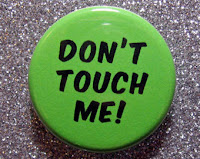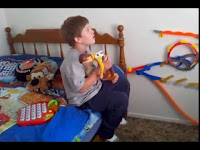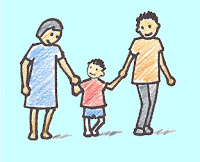~~~~~~~~~~~~~~~~~~~~~~~~~~
Hi Mark, all the way from little old New Zealand.. We have just recently come across your online support group and so many things ring true to what we are going through at the moment with our Miss 14 ( we've been in a living nightmare for the last year and a half )
And no light at the end if the tunnel. we have almost given up. I get called a f***ing whore, s**t, b**ch on a daily basis, get food thrown over me, over walls, floors etc telling me how disgusting the food I make is. That stuff is only the start of it. She has currently decided that we, her parents, are the worst people in the world and has run away to stay with her also 14 year old boyfriend and his family. We have told her we love her, but this time it is her choice to make. She either wants to be here, or she doesn't. That this time, we won't stop her, no police etc, and that she can come home when she is ready. As long as she's ready to to start making a change and also making an effort. It's been almost 2 weeks.
~~~~~~~~~~~~~~~~~~~~~~~~~~~~~~~~~
CASTING ANNOUNCEMENT:
NEW TV CONCEPT SEARCHING FOR PARENTS OF OUT-OF-CONTROL YOUNG ADULTS
Does your son or daughter have a defiant, reckless, and/or selfish attitude? Are these behavioral issues affecting your family? Does your child need help getting back on track?
An award-winning television production company is searching for parents who need help transforming their child's extreme behavior. If your son or daughter is going through a destructive phase that is endangering his/her future, we want to help. This docu-reality concept will use an intervention program to motivate impulsive and destructive youths to change their ways. If you and your family are ready for some professional help, please write to us today.
To be considered, please visit goo.gl/Uk4zjJ
If you have any trouble accessing the application, please email our team at: ChangeTheFutureTV@gmail.com
~~~~~~~~~~~~~~~~~~~~~~~~~~~~
Basically, my son is non-violent, very lovely, smiley, very well-behaved [loves to co-operate & collaborate] & we can see how he tries hard to be calm & open to correction. All the adults invariably love him for his behaviour & purity of thought. Even his carer said she absolutely loves him & he won role model of the year because he is caring, kind & self-controlled from intensive 1 on 1 training. Yet, he has no social skills & always tell the truth 100% of the time however tactless.
I find coaching him social skills very difficult as he's only an enthusiastic listener at his own familiar home. Outside of what is thoroughly familiar like being comfortable at home & with adults, he days dreams & fails to listen when youngsters talk about anything that is not within his sphere of obsessive interest - he zones out... another world. This zone-out inability to listen to a turn-taking conversation frustratingly for all but himself happens almost all the time. If you play/talk snooker/music with him, he would take turns, easily, no problem. He would not zone out but how many youths love snooker as obsessively or plays as much music as he does? None. He has not met any. Not even one - his age.
~~~~~~~~~~~~~~~~~~~~~~~~~~~~~
We are looking for a therapist for our son to also help him as we go through the process. We live in Alpharetta GA in case you know of anyone. We have a very high functioning son and somehow we have forgotten in the process that he has Aspergers. He is now 16 and after two years of fighting with him, we are just now realizing that while he has grown so much, he still has areas that we need to focus. I feel terribly that we did not realize this before.
He is in a college prep program and really doing extremely well, but here is my question. The environment he in at 16 is stressful, he is making friends and doing well in classes. But home life is full of melt downs and challenges. He hides out in his room and will not talk to us about any issues or conversations so we cannot help him. He truly dislikes being told he is different and hates it when we tell him he has any social or emotional challenges. Do we continue to push him to understand his limitations - so he understands he still needs to partner with us? He doesn’t want to be considered different and thinks that HFA means he is not smart or able. I have not been able to change this perception for him at all. Thoughts? Advice?
~~~~~~~~~~~~~~~~~~~~~~~
Hello Mark,
I am a single mom with a 15 years old son. I had triplets which are 22 all scholar and athletic. I home school them for several years and had never had an issue. My younger son on the other hand always been an issue with school, social and activities. He was diagnose with ADHD at 9 years old. I have been able to help him with school until this year. He just started high school and struggle to get a "d" he is failing 9th grade. I am getting lots of pressure from
My ex and the other children. They are telling me I am too soft not disciplinary enough. I see my son with so
Much anxiety that I don't want to add to it. I don't know what else to do with him. We had several session with a counselor and she mention to have him
Tested for asperger. I have to wait until August for insurance to pay for it but when I read the symptom, He has at least 75% of it. So now I do see the light at the end of the tunnel. I thought I was going crazy for a while. He doesn't do anything that I tell him. He doesn't want any of my help. I just need a little direction since this is new to me. I will buy your audio book tonight. If you have any other advise, it would be awesome.
~~~~~~~~~~~~~~~~~~~~~~~~~~~~~
My friend teen daughter is way out of control. Besides trying blackmail to get what she want now she is cutting and uses the excuse that she is being abused at home.. I know that she is not being abused. Example last week she came home drunk after her curfew. Her mother scolded her for drinking so she went to her room and cut her wrists if her mother had not heard her fall to the floor she would have bleed to death. When the police questioned her she told them that she was being abused now the mother faces losing not only one child but her youngest daughter also. The teen refuses to go to any consoling. It appears that the police only believe the teen on what is going on. I have even talked to them and they do not seem to listen to anyone but the teen.
~~~~~~~~~~~~~~~~~~~~~~~~~~~~
~~~~~~~~~~~~~~~~~~~~~~~~~~~
Once again I am reaching out to a discrete group of clinicians with experience in evaluating or treating young men with ASD who were charged criminally for engaging in inappropriate behavior, typically online viewing of child pornography. I am a criminal defense lawyer. Over the past decade, I have become increasingly involved, directly or indirectly, in defending these young men.
I need to get the benefit of collective experiences on a question, hopefully in a way that only puts a small burden on you, but which may provide enormous help to a present clients. I am only asking around in the belief that it may be possible to provide what I need without spending a great deal of time.
I am currently working on a cases initially involving a young men with ASD who was arrested for viewing child pornography. However when being interrogated he volunteered that several years earlier he had touched a much younger niece under her underwear. That is difficult enough to deal with. But see what happened at the time and how it affected the cop:
During this interview as he would recall the specific details he would smile uncontrollably and giggle. It was only during the time he was talking about the actual sexual assaults of the child. It was actually disturbing even to me as he went over the two assaults. What was disturbing specifically was the smile and laughter, the apparent satisfaction while in the moment of the assault. It was clear that he was reliving the moment and it was bringing him satisfaction while explaining it to me . . . He said ‘even going over what I’ve done I don’t consider myself what the TV calls sexual predators. I’m not going after kids.’ I then said ‘yeah you’re not ripping kids out of your neighborhood and tying them up in your basement.’ When I said that he got really excited and giggled with a huge smile from ear to ear and said ‘no.’ This actually was so disturbing to me that I had to move my chair away from him and stand up. . . . I then asked him what would prevent him from touching any other children in the future, he just again smiled and giggled . . . At this point I confronted him and told him that it was disturbing to me that he giggled and appeared excited when we were talking about assaulting little girls. He agreed that he could ‘see how it would be disturbing.’ I then explained that it was disturbing and scary to me that when I talked about touching other little girls that he was smiling and giggling, clearly excited. He responded ‘yeah that’s bad.’”
This is a perfect and catastrophic example of misinterpreting someone with ASD because of their inappropriate facial expressions. Of course the clinical and family history confirms that smirking, etc. is the way he reacts under stress or when being criticized, a very common experience. However, if not explained to the satisfaction of the prosecutor and judge, I see no chance of avoiding a criminal conviction and sex offender registration and substantial jail time.
I would like to provide as many examples as I can this kind of misunderstanding. So I am looking for examples in literature, or from clinical practices of individuals who have had similar problems, especially with the police, that I can use as examples. And whatever useful information I get I will try to make it available to other defense lawyers seeking to help the same population.
As you can see from the attached, I am relying on fairly general stuff, in literature and individual reports from individuals on web sites like Wrong Planet. I need something more. Any technical additions or references you can think of for me to add, I would appreciate greatly.
~~~~~~~~~~~~~~~~~~~~~~
~~~~~~~~~~~~~~~~~~~~~~~~~~
Dear Mark,
~~~~~~~~~~~~~~~~~~~~~~~~~~~
~~~~~~~~~~~~~~~~~~~~~~~~~~~
~~~~~~~~~~~~~~~~~~~~~~~~~~~~
My brother, a minister, and his wife adopted a baby 13 years ago
Joshua's mother was on drugs and drank
He was born 3 months premature and no one knew what could happen
He has Asbergers
Is very smart with electronics
Reads well but has no comprehension skills
He doesn't listen well to his parents
He explodes and has no control
He has no social skills
My sister-in-law has been taking him to Massachusetts to an organization that works with brain waves ... it is costly and I have not seen much progress
Can he have a normal life
He has been home schooled along with going to christian schools but neither has been too helpful - he doesn't listen to his mother and gets frustrated at school which makes him explode at home
My brother doesn't make a lot of money
my sister-in-law won't send Joshua to a public school in Bethlehem as they live in the inner city ... therefore he has not been getting much interaction with other kids or school
Are there public schools that can be helpful and how do you find them
Do you know anything about organizations that say they can help readjust the brain through various lessons ... if might be something for the future but now I think it is just taking money from parents who are desperate
I worry that Joshua will get worse as he gets older and though he has a loving family, he doesn't respond well ... he knows he is adopted and wishes a rich family had adopted him
I wish there was something that can help these kids ... more so with the anger issues
I don't know if you have any suggestions, but anything you say would be appreciated.
~~~~~~~~~~~~~~~~~~~~~~~~~~~
We have a very difficult teen, I have some areas to improve and now understand why some things I do are working.







.jpg)


